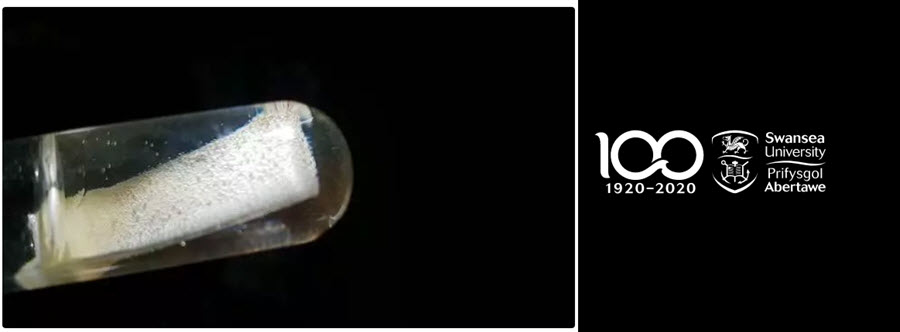
Sunlight could be used to convert hazardous medical waste into clean hydrogen fuel, using a new technique being developed by a joint Wales/India team led by Swansea University researchers.
The project has just been awarded £47,000 of funding by the Welsh Government.
The NHS already spends £700 million a year disposing of medical waste. The COVID pandemic is creating vast amounts of additional waste, such as masks and other protective equipment.
The Swansea-led team are developing a novel process called photoreforming. This uses sunlight to simultaneously kill viruses and convert non-recyclable waste into clean hydrogen fuel. The process works by using nanostructured semiconductors to drive the degradation of waste and pathogens with sunlight.
Currently, medical waste is disposed of by incineration. In contrast, photoreforming does not generate greenhouse gases and works at ambient temperature. As well as producing hydrogen fuel, the process can also generate organic feedstocks for the chemical industry.
This new research builds on the team’s previous work on generating hydrogen from waste plastics.
The team includes epidemiology experts from India’s King Institute of Preventive Medicine & Research and Thiruvalluvar University. They are helping examine the photocatalysts’ antiviral activity against different pathogens, including SARS-CoV-2, the virus that causes COVID-19. The nanomaterials group at Indian Institute of Technology Mandi are also partners in the project.
The researchers are now actively looking for industry partners to commercialise their technology.
Dr Moritz Kuehnel, project lead and senior lecturer in Chemistry at Swansea University, says: “Since the outbreak of the COVID-19 pandemic, we have witnessed a global surge in single-use medical waste and PPE polluting the environment such as disposable face masks littering beaches. The NHS already spends more than £700m every year on waste disposal, even before COVID waste. Applying our technology to reprocess just 1% of this waste would save millions and mitigate pollution at the same time.”
Dr Sudhaghar Pitchaimuthu, co-investigator and Sêr Cymru-II Rising Star Fellow at Swansea University’s College of Engineering, adds “The simplicity and low cost of photoreforming make it easier to implement in countries that do not have an established recycling system. By turning this hazardous waste into a resource, we aim to provide a commercial incentive to collect waste from the environment and prevent littering in the first place.”
Kirsty Williams, Welsh Government Education Minister, said: “I’m pleased our Sêr Cymru scheme can support this programme at Swansea University, which will help in the fight against the coronavirus while also providing environmental and economic benefits.”
Swansea University is a world-class, research-led, dual campus university offering a first-class student experience and has one of the best employability rates of graduates in the UK. The University has the highest possible rating for teaching – the Gold rating in the Teaching Excellence Framework (TEF) in 2018 and was commended for its high proportions of students achieving consistently outstanding outcomes.
Swansea climbed 14 places to 31st in the Guardian University Guide 2019, making us Wales’ top ranked university, with one of the best success rates of graduates gaining employment in the UK and the same overall satisfaction level as the Number 1 ranked university.
The 2014 Research Excellence Framework (REF) 2014 results saw Swansea make the ‘biggest leap among research-intensive institutions’ in the UK (Times Higher Education, December 2014) and achieved its ambition to be a top 30 research University, soaring up the league table to 26th in the UK.
The University is in the top 300 best universities in the world, ranked in the 251-300 group in The Times Higher Education World University rankings 2018. Swansea University now has 23 main partners, awarding joint degrees and post-graduate qualifications.
The University was established in 1920 and was the first campus university in the UK. It currently offers around 350 undergraduate courses and 350 postgraduate courses to circa 20,000 undergraduate and postgraduate students. The University has ambitious expansion plans as it moves towards its centenary in 2020 and aims to continue to extend its global reach and realise its domestic and international potential.
Swansea University is a registered charity. No.1138342. Visit http://www.
Picture
Tiny hydrogen bubbles evolving from a piece of PET plastic irradiated with light. PET (polyethylene terephthalate) is the plastic used in most water bottles.
Credit: Dr Moritz Kuehnel, Swansea University
Read the most up to date Fuel Cell and Hydrogen Industry news at FuelCellsWorks




